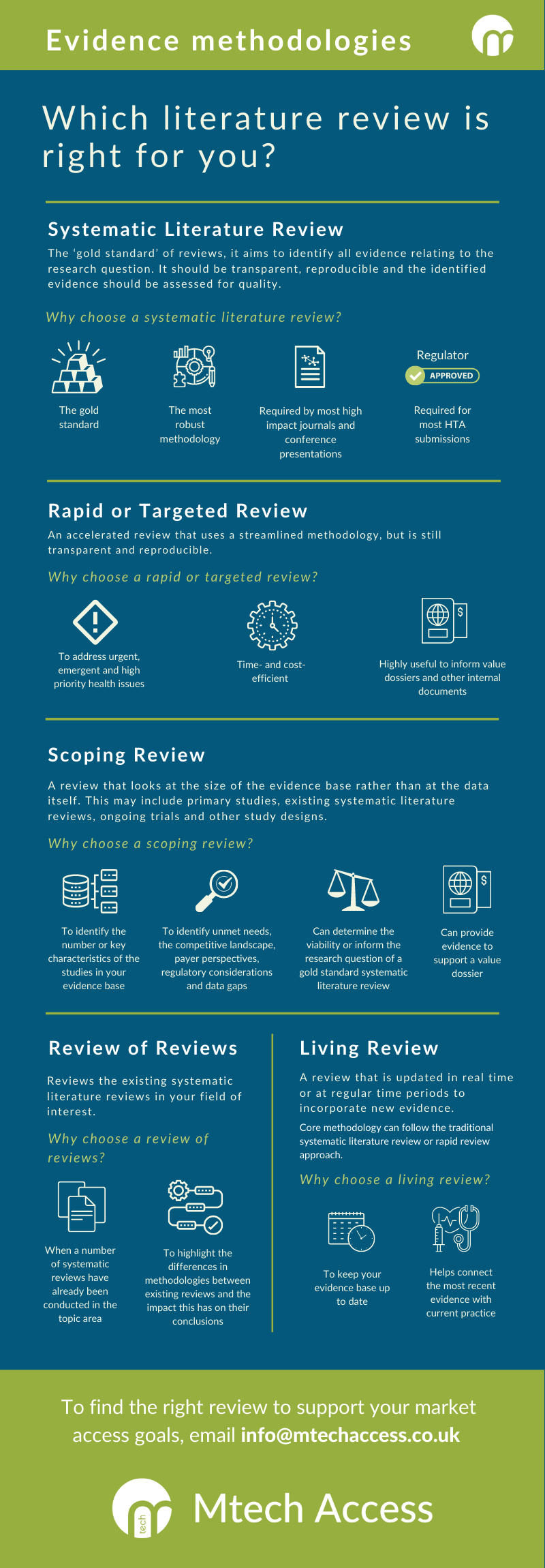Finding, bringing together and synthesising a comprehensive evidence base is a key part of the reimbursement process and the wider market access journey for pharmaceutical products. This evidence generation process typically involves some form of systematic literature review (SLR). Yet not all reviews are created equally. Here we explore the different options available and when these methodologies can best support different evidence generation goals.
Questions to consider:
Before deciding on an evidence synthesis approach, it is helpful to consider:
- Which specific questions are you looking to answer with the review? What type of evidence do you require?
- What will you use the evidence for? Is it to support a HTA submission, is it for external publication, or is it for inclusion in an internal document like a value dossier?
- Could other research activities help inform the review? For instance, would a survey of patients or healthcare professionals help you to refine the review parameters?
- Are there time pressures – do you need the review to be conducted by a certain date?
- What is your budget?
Your answers to these questions will have a bearing on which review methodology will best support your evidence synthesis strategy.
Selecting the right review:
Here, we list some of the most popular types of review and the key reasons to select the review:
Systematic Literature Review:
Systematic literature reviews (SLRs) are widely accepted as the gold-standard for evidence generation, especially when accompanied by protocol registration (such as on the International Prospective Register of Systematic Reviews (PROSPERO)).
The review employs a robust methodology that aims to identify all the evidence relating to a carefully considered research question. The approach taken should be transparent, well documented, and reproducible by external parties and the evidence should be assessed for quality.
The highest quality SLRs enable decisions to be based on the strongest evidence base possible. As a result, this type of review is required for most HTA submissions and for most formal documentation and publications.
If time and budget allow, this is often the best option.
Rapid or targeted review:
If time is of the essence, then a rapid or targeted review can be a good option.
This is a form of knowledge synthesis that gathers evidence in a more time- and cost-efficient manner. The systematic review process is accelerated by streamlining specific methods and approaches to rapidly produce evidence in a resource-efficient way.
Rapid reviews do not offer the full rigour of a SLR, and may not be suitable for HTA submissions. However, they do support requests for timely evidence synthesis, including urgent, emergent, and high priority health issues. The process is still fully transparent, well documented, and reproducible to enable external scrutiny. The rapid review method has been widely used during the COVID crisis to help ensure treatments reach patients in a timely manner.
A rapid or targeted review is particularly useful for synthesising evidence for internal value dossiers, where the rigour of a SLR is often not required.
Scoping Review:
A scoping review can be a great option if you require more information to shape your evidence strategy.
A scoping review looks at the size of the evidence base rather than at the data itself. This can include primary studies, existing SLRs, ongoing trials, and a variety of other study designs.
Scoping reviews can identify the size of the evidence base for your product and the particular characteristics of relevant studies. They can also map out the competitive landscape in terms of other available licensed or emerging treatments.
This can help inform your broader evidence strategy as it offers information on unmet need, competitive landscape, payer perspectives, regulatory considerations and evidence gaps. It is particularly useful ahead of a full SLR to either help shape the research question or highlight limited amounts of evidence that may make a full SLR unnecessary.
A scoping review can also be used to provide evidence to support your value proposition and wider value story.
Review of reviews:
Not all SLRs can be considered equal. Differences in review methodology can lead to disparate conclusions and decisions, even for the same research question. These differences can be formally assessed to determine why they may have emerged, and where the most likely conclusions lie.
If a wide range of SLRs occupy your evidence base, a review of reviews will compare the quality or risk of bias between them.
This will enable you to identify the highest quality SLRs and can help you demonstrate how your product adds value in a crowded field.
Living systematic review:
Most new products emerge into a fast paced, evolving market. Where your product and evidence will be used in such a dynamic setting, a living review can be an excellent option.
In this approach, the review is updated in real-time to incorporate new evidence as it appears, either via continuous searches or via searches at regular, pre-agreed intervals. The core methodology behind a living review can be that of a full SLR or a rapid review.
This type of review is of increasing interest to evidence producers, decision makers, guideline developers, funders and publishers as a way to connect the most up-to-date evidence with current practice.
Other evidence generation options:
It is also worth noting that other evidence generation and evaluation methodologies have their place. Most notably, network meta-analysis is a key technique for evaluating comparative evidence using indirect statistical methods.
Building your strategy:
Developing your evidence synthesis strategy and selecting the right review can be a daunting process. Our evidence generation team at Mtech Access understand the different pressures on HEOR and market access teams, and can help you select the right evidence strategy, build a robust evidence base and get this crucial step right to ensure the best treatments reach patients.
Leading pharmaceutical, diagnostic and medtech companies choose Mtech Access to develop their evidence strategy and synthesise their evidence base.
For support with your evidence strategy and to discuss these review options with our specialists, email info@mtechaccess.co.uk to arrange a no-obligation consultation call.



